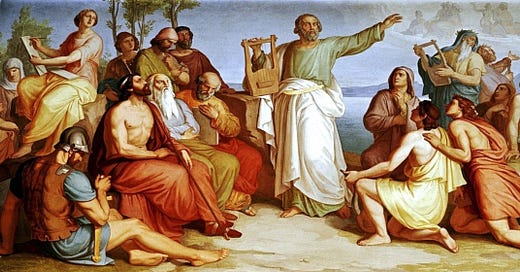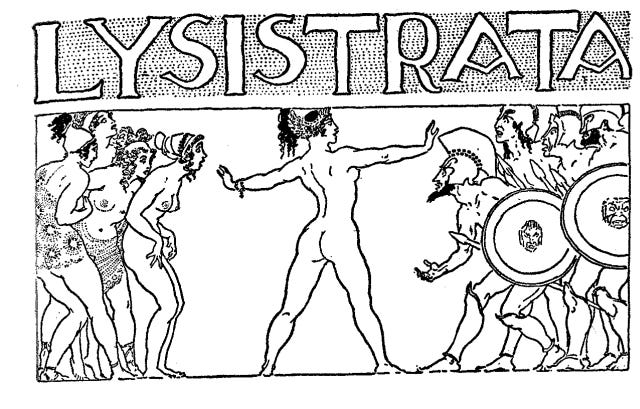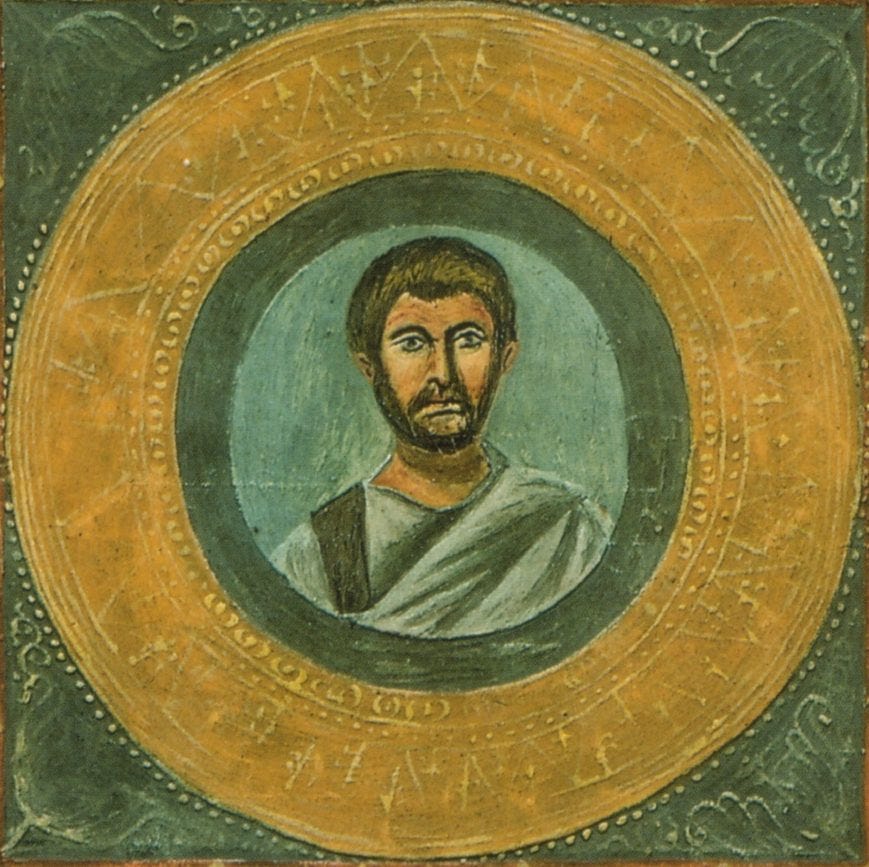Dear Classical Wisdom Readers,
In the words of one of our dear readers, Chip: “thank you so much for the pop-up discussion on plagiarism. I appreciate your bringing in 3000 years to help our present concerns.”
I just love the idea of a ‘pop-up discussion!’ What a cool term. May there be many in our future...
You see, Chip was referring to last Wednesday’s conversation on “What is Plagiarism?” with Professors James Hankins and Peter Adamson. We discussed attitudes to originality throughout the ages, plagiarism versus forgery, the economic versus individualistic incentives for copying...
And what to do with once well known allusions? Will we be charged for coyfully quoting Shakespeare... or indeed Homer?
Oh Muses, can you please inspire us with more original ideas?!
One small aspect of our ‘pop-up’ that we didn’t delve into as much as I may have hoped, was the ancient examples and incidents of plagiarism to counter the idea that it's a more modern concept...
Fortunately Michael Fontaine, Classics professor at Cornell University, has come to our aid with an artful and timely piece on the “Duplicative Language in Ancient Greece and Rome” for your enjoyment and edification.
It turns out the worry of unappreciated clever references goes right back to the beginning... and the greats can teach us exactly how to steal from Homer…
Enjoy!
All the best,
Anya Leonard
Founder and Director
Classical Wisdom
P.S. I did in fact promise you more on Aristophanes today... which will be delivered next week. But if you want to thoroughly appreciate our next piece on the great comic’s insights on Man and War, do take the time to read one of his most enjoyed plays of all time, The Lysistrata.
Classical Wisdom Members can enjoy an in depth article on the Prince of Comedy, as well as The Lysistrata Ebook Here:
If you aren’t a member, do make sure to join our growing community to enjoy the full breadth of the Classics here:
Duplicative Language in Ancient Greece and Rome
By Mike Fontaine
Stop me if you’ve heard this before…
Nah, just kidding. Plagiarism is in the news and it’s serious stuff. Those who say it’s no big deal have (at best) never had it happen to them. I have, at least a half-dozen times that I’m aware of, and I have to say it does feel invasive and creepy and unpleasant. It’s not so different from being robbed, really, because that’s what plagiarism is.
I bet you’ve heard by now that plagiarius is the Latin word for a kidnapper. It’s true, that’s the metaphor: a plagiarist is one who steals a free person and then sells him or her off as a slave. The internet is full of posts that will tell you Martial—a hilarious writer of “epigrams,” i.e. short poems with a witty zinger at the end—was the first to use the word that way. Again, that’s true; his epigram 1.52 is typically cited as evidence. It’s not very good, but here it is in the clunky Loeb translation by Shackleton Bailey:
Quintianus, I commend you my little books—that is, however, if I can call them mine when your poet friend recites them. If they complain of harsh enslavement, come forward to claim their freedom and give bail as required. And when he calls himself their owner, say they are mine, discharged from my hand. If you shout this three or four times, you will make the kidnapper (plagiario) ashamed of himself.
But the practice of plagiarism goes much further back than that word, and the earlier cases are much more scandalous and fun! For instance, despite all their jokes, the playwrights who adapted Roman stage comedies for audiences in the city of Rome in the 2nd century BCE—that’s about 250 years before Martial wrote—could be a seriously nasty bunch.
(Why? Follow the money: these playwrights had to win a state contract each year if they wanted to produce a play, and winning meant edging out rivals. It seems it was all or nothing. And sure, they could compete on merit, but it’s much easier, they discovered, to eliminate rivals by accusing them of plagiarism. Sound familiar?)
The most famous example comes right at the start of a comedy by Terence, a Roman playwright who was active from 166-160 BCE. The comedy in question is titled The Eunuch, and it was first performed on the Palatine Hill in Rome in the year 161 BCE. Here's the relevant part in the Oxford translation by the late Peter Brown (to which I’ve added some clarifications and key words in brackets):
As for the play that we’re now about to perform, The Eunuch by Menander, after the aediles [= Roman officials] had bought it, he [= Terence's rival playwright] fixed things so that he had a chance to look at it. When the officials were present, a run-through began. He cried out that it was a thief [furem], not an author, who had put the play on, but that he hadn’t put one over on him all the same. He said that there was a play called The Toady by Naevius and Plautus, an old play, and that the characters of the parasite and the soldier had been lifted [ablatam] from it.
As you see, Terence’s rival—an obscure guy named Luscius of Lanuvium—didn’t soft-pedal the charges and he didn’t mince words! Theft is theft, plain and simple; no metaphor needed. So for him, the words for "plagiarize" here are just the regular words meaning "to steal" (furem = thief and auferre = steal).
Now here’s something else interesting. Open any introduction to Terence’s comedies, and you’ll read that in antiquity, he was called a mini-Menander (dimidatus Menander—the phrase goes back to Julius Caesar). Who was Menander? He was the greatest playwright of Greek “New Comedy,” and he’d lived and wrote about 150 years before Terence. As it happens, as I once pointed out, Menander himself was accused of plagiarism. The details are preserved in a discussion of klope (theft, plagiarism) in a text called Praeparatio Evangelica by the church historian Eusebius (10.3.12–13):
This affliction metastasized even in the great Menander. While Aristophanes of Byzantium exposed him gently in his Parallel Extracts from Him and Those he Plagiarized [eklepsen] because he was overly fond of him, Latinus devoted six books he titled Un-Menandrian Elements in Menander to parading the extent of his plagiarism [klopai] . . . . Moreover, it is with the air of one who has detected a massive heist that Caecilius [of Calacte] declares that in his Superstitious Man Menander copied [metagrapsai] an entire play—Antiphanes’s Augur—from beginning to end.
The Aristophanes mentioned here isn’t the famous comedian, he’s the less-famous librarian of Alexandria who died about 10 or 15 years before Terence’s career began. As I wrote in that essay linked above—because I don’t want to plagiarize myself!—“His two books were probably collections of parallel diction rather than accusations of plagiarism, but a malicious interpretation of them, like that of Caecilius here (whose reaction resembles that of Luscius in Eunuchus 23–24), probably arose almost immediately.”
In other words, examples of “duplicative language” were discovered and apparently weaponized against him. Hmm.
Is duplicative language definitely plagiarism, though?
As antiquity was giving way to the Middle Ages, a late Roman author wondered the same thing. His name is Macrobius, and he wrote a huge book called the Saturnalia. The entirety of book five (here in Latin; there’s no English translation on the internet) is consumed with precisely the question of whether duplicative language is plagiarism or not, and the author in the hot seat is no less than Virgil. The interlocutors find scores of places where Virgil duplicated language in the Iliad, the Odyssey, Ennius, and other authors. (By the way, Macrobius’ parallels have long since been absorbed into modern commentaries…not always with attribution!)
How can Virgil’s “borrowings” be defended? In Saturnalia section 16 (as Bob Kaster translates it in the Loeb), we’re treated to one of history’s all-time best dodges:
‘Please do go on,’ Avienus said, ‘and track down everything he [Virgil] took from Homer: what could be more pleasant than hearing the two foremost poets treating the same subjects? These three things are all reckoned equally impossible: taking a thunderbolt from Jupiter, his club from Hercules, or a line from Homer.
In other words, if you’re a truly great literary artist, you get a free pass. Because in that case, the duplicative language is an allusion, not plagiarism, and trying to pass it off as your own would be as hard as stealing Hercules’ club.
Allusion is a topic for another day, so I’ll end by pointing out that Macrobius is an arch-plagiarist himself. Not many know this, but later portions of Saturnalia take huge passages from Plutarch’s Moralia without saying so. They’re well worth studying if you want to see how a late Roman author translates Greek into Latin! (Have a look at Plutarch’s Table Talk 2.1.4-13 (631c-634f) alongside Saturnalia 7.3.2-22 if you want to see what I mean.)
By the way, in the recent Classical Wisdom discussion “What is Plagiarism?” people wondered how early plagiarism was regarded as something naughty. We didn’t reach a definite conclusion, but I can’t resist pointing one great example out. Back in 2020, I translated the preface of Vincent Obsopoeus’ 1536 poem The Art of Drinking and put it online (here). In the course of doing so, I discovered that in 1577, a man named Franciscus Iunctinus of Florence ripped off Obsopoeus’ preface entirely – verbatim! Little did he know he’d get exposed by Google Books four centuries later.
Caveat plagiarius!
PS – Fun fact: the Latin verb compilare, which gives us the English word “compilation,” means “to snatch together and carry off, to plunder, pillage, rob.” (That definition comes from Lewis and Short.)
To quote Wilson Mizner (screenwriter), “If you steal from one author, it’s plagiarism, and if you steal from many, it’s research.”
What do you think dear reader? Is it impossible to never plagiarism? How original can we be? And why throughout history are there times when it is more or less serious? Click like to show your love of the classics and comment below:








Homer is the foundation of Western culture. Does Classical Wisdom have a book and/or video series that summarizes Greek mythology? I think that'd be a great project!
It seems like some concensus could be reached regarding length of passage copied and relevance of original topic to subsequent writing. For example, how is it possible, oh wait, did I just kidnap Michael Wilcox's opening words?
There is a clear distinction between a common expression being used and lifting an entire paragraph verbatim and presenting it as your own. Admittedly, the line can get blurry, but I would hope that the fact plagiarism is ancient and has been weaponized in the past wouldn't blind us to the actions of certain university presidents writing in an arena where it is well understood that discovered plagiarism has consequences.